Over the past six seasons, Jacob Trouba has developed from a blue-chip prospect to an elite defenseman and a stalwart on the Winnipeg Jets’ blue line. Trouba, alongside Josh Morrissey on the Jets’ top defensive pairing, has been tasked with shutting down the opponent’s best for many seasons. He has logged an average of nearly 23 minutes per game in his 408 career contests, and this past season, reached the 50-point plateau for the first time in his career.
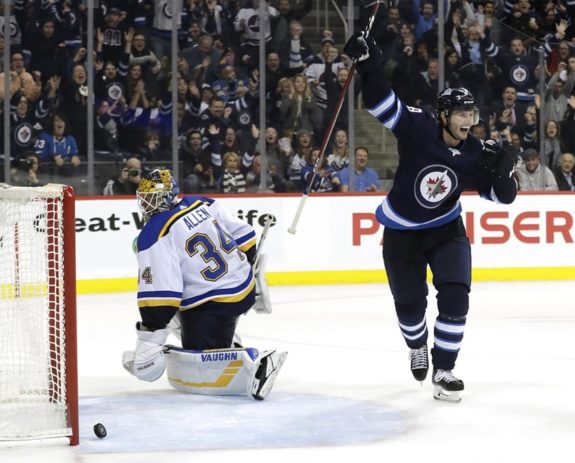
Despite how important Trouba’s been to the Jets’ rise to competitiveness, it’s becoming increasingly clear, for a number of reasons, that moving the 25-year-old makes the most sense for the Jets.
A Long-Term Deal Seems Unlikely
Negotiations Between Jets & Trouba Have Never Gone Well
The main sticking point has been, and will continue to be, the $7-plus million dollar figure Trouba and his agent, Kurt Overhardt, have been unwilling to acquiesce on.
Last summer, Trouba became the first player ever to take the Jets to arbitration. Even with the help of a third party, and an arduously drawn out arbitration process, the two sides still couldn’t come to a deal, settling on a one-year, stop-gap deal worth $5.5 million that’s brought us to where we are now.
This was a month and a bit after Trouba and Overhardt went public saying they wanted to sign a new deal as soon as possible, with the Michigander himself saying “the quicker the better” (from ‘Trouba holdout ancient history, agent says as deadline to sign new contract looms,’ Winnipeg Free Press, 06/05/19.)
It’s safe to say, given Trouba’s huge role and strong season — he played all 82 games and put up a career-high 50 points, that the price he’ll be asking won’t be lower.
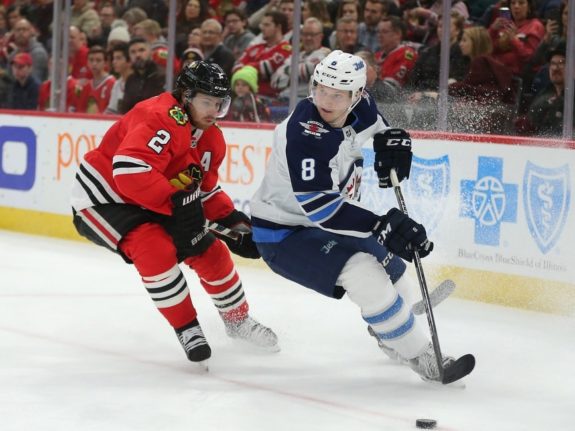
The history of negotiations between Trouba, Overhardt, and Jets general manager Kevin Cheveldayoff is a tumultuous one. In May 2016, Trouba requested a trade before a six-month stalemate — over Trouba’s insistence to play the right side — ensued, one that only ended more than a month into the 2016-17 campaign when Trouba settled for a two-year bridge deal.
Trouba May Want Out of Winnipeg, Anyway
That led to questions about Trouba’s loyalty, which still linger to this day. Being a Jet over being a member of any other NHL team doesn’t seem particularly important to him, nor does it seem he’s attached to Winnipeg as a place.
In his Monday exit interview after the Jets’ disappointing first-round exit, Trouba was non-committal when asked if he wanted to be a long-term member of the Jets, and in essence, said a whole lot of nothing.
“Same answer as always,” he said. “We’ll figure it out once things get going in the summer, what’s best, move forward from there. We’ve got to sit down and figure out what to do moving forward. I haven’t really thought about it — I tried to put it in the back of my mind as much as I could this year, just forget about it, and we’ll deal with it when the time comes.”
When asked later if he would sign a team-friendly contract to help mitigate the Jets’ impending cap crunch — something that could potentially allow them to retain more of their 15 restricted and unrestricted free agents, Trouba shut down any prospect of a “hometown discount.”
In a sense, Trouba is right. It’s not a player’s job to reconcile team finances; it’s the GMs. Players have no obligation to take less than what they feel they deserve — NHL careers can be short and players must capitalize when they can. Besides, Winnipeg is not Trouba’s hometown.
Some, however, have shown themselves to be team-first guys in that regard. When Adam Lowry inked a new deal last summer, he put the team ahead of individual concerns and prioritized his desire for victory over his desire for cash.
Related: Winnipeg Jets Lucky to Have Team Player Like Adam Lowry
However, given Trouba’s lack of attachment to Winnipeg (some, such as The Hockey News Ken Campbell, opine Trouba doesn’t want to play in Canada at all, where taxes are higher) and his historical penchant for not budging when it comes to numbers, his answer is not surprising.
If the Jets and Trouba couldn’t get things figured out even with an arbitrator’s help last summer, how can they be expected to figure it out this summer, especially when Trouba’s shown he won’t re-up unless he gets exactly what he wants?
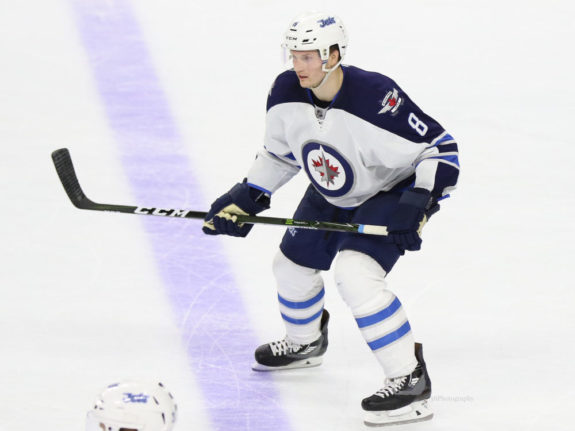
The Jets control Trouba for one more season before he becomes an unrestricted free agent. If arbitration fails again this summer, it would basically guarantee he would walk for nothing after the 2019-20 season. The Jets need to do everything in their power to protect themselves from that happening.
Jets Could Spend the Money Better Elsewhere
Jets Could Retain Two for the Price of One…
Of the Jets’ seven unrestricted free agents, the most important two to re-sign — in this writer’s view, anyhow — are Tyler Myers and Brandon Tanev. The $7 or 8 million the Jets would spend on Trouba would be better spent trying to retain this pair instead. Trading Trouba is the only way they can avoid losing them for nothing come July.
Myers, 28, is an unrestricted free agent for the first time in his career. The veteran of 635 career NHL games just completed the last year of his seven-year contract worth $5.5 million annually that the Jets inherited from the Buffalo Sabres when they acquired the hulking defenseman as part of the 2015 blockbuster deal that sent Evander Kane the other way.
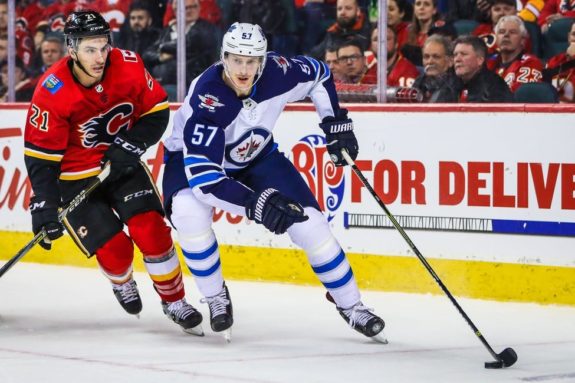
Myers had a terrible start to 2018-19 season but really picked up his play as the season went along and shouldered a huge rule when the Jets’ blue line was ravaged by injury.
Since his write-off 2016-17 campaign, Myers has stayed healthy and appeared in all-but-two regular season games for the Jets, putting up 67 points in those 162 games.
Unlike Trouba, there’s no doubt Myers wants to be a Jet going forward. Also unlike Trouba, he talked about the group rather than just himself in his exit interview. having players dedicated to the team they’re on and not just their pocketbook cannot not be quantified monetarily, but is paramount nonetheless.
“I’ve always said I really enjoy our room. I think we have a team that has some really good pieces around it… love the group, we’ll see what happens here in the next month or two.”
“I’d love to start conversations with Chev if they’re open to it and we’ll see what we can get done,” he said later.
If Myers was to received a figure comparable to his last contract, it would leave somewhere between $1.5 and 2 million to give to “Tasmanian Devil” Tanev, who is due for a raise after his best season as a professional.
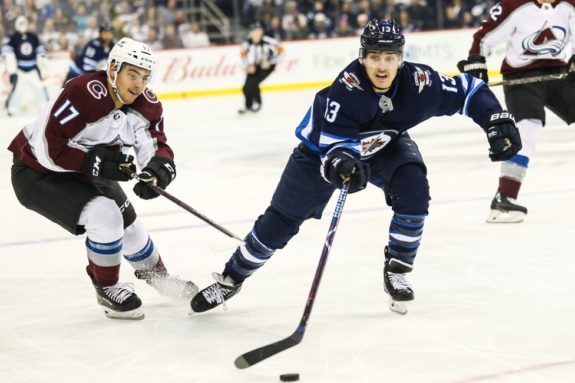
A Jets team without Tanev would be like an IKEA furniture set without the bolts to hold it together. The truculent, fearless winger dished out a team-leading 278 hits, consistently sacrificed his body by blocking 81 shots, and notched a career-high 29 points for good measure thanks to his speed and hard-working nature.
Related: Multi-Talented Tanev Boosting Jets’ Third Line
He’s the ‘T’ and arguably the most integral member of the feisty, effective and uniquely-talented ‘TLC’ line along Adam Lowry and Andrew Copp — a trio that kept being reunited throughout 2018-19 and often drove play and swung momentum when they were together.
Tanev’s pain threshold is much higher than a normal human’s, leading to some to speculate he’s actually a robot. He’s such a gritty gamer that even an Eric Staal slash — which “broke the top half of his finger right off to the point they couldn’t put it back together until they put a screw in it,” according to head coach Paul Maurice — only kept him out of the lineup for two games.
Only retaining one of Myers or Tanev instead Trouba would be a net loss, but retaining both of them would be a net benefit.
…Or Possibly Even Lock Down Three
The Myers/Tanev combination is just one possibility. If the Jets were to let Myers walk, they could even end up retaining three with the Trouba money. In that case, the most compelling trio to go after would be Ben Chiarot and Andrew Copp in addition to Tanev.
Ben Chiarot, a pending UFA, played a heavy, responsible game that was a big boon to the Jets this season. He logged a career-high average time on ice of 18:37, set another career-high with 20 points, and delivered 171 hits, the most of any Jets d-man.
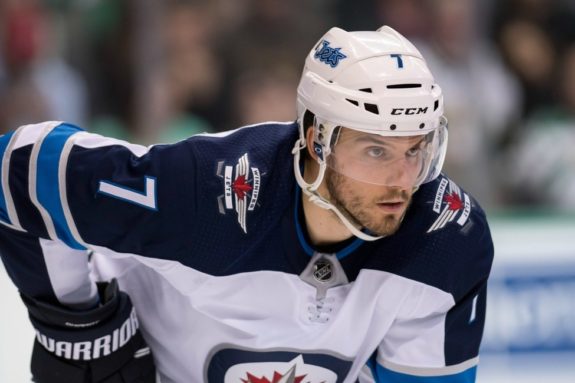
For the role he played over the past two seasons, Chiarot was a bargain, making $1.4 million annually on a two-year deal. Given his ever-increasing importance, he would likely command two million or more on a new contract.
Copp, meanwhile, is an exceedingly intelligent player. In addition to being a member of the aforementioned TLC line, he was critical to the success of a fourth line comprised of himself, Mason Appleton, and the now-departed Brendan Lemieux that played together between New Year’s Eve and the trade deadline.
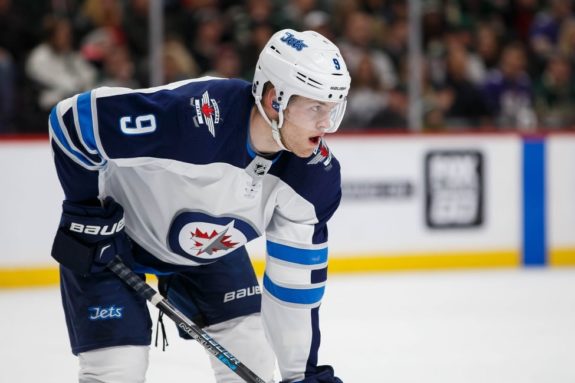
Copp drove that line from the middle — which proved to be a force at possessing the puck at five-on-five— and never viewed his move to the fourth-line as a demotion. Like Tanev and Chiarot, he was a steal, making a little under one million for each of the past two seasons, but will likely want to at least double that going forward.
Even if Tanev, Chiarot, and Copp all asked for $2.5 million annually, the money saved by trading Trouba would just about cover it.
Trouba’s Departure Would Open Door for Defensive Prospects
It’s obvious the defensive status quo in Winnipeg is not good enough and changes are needed.
“The piece to our game that I don’t think ever came together the way we wanted it to was the defensive side of our game,” head coach Paul Maurice said Monday of his team that gave up 243 goals in 2018-19 — compared to 216 the season before — and lost a league-worst 11 games when leading after two, including twice in the first round against the St. Louis Blues. “We’re going to get lots of guys that put up big numbers and had good offensive years, but our defensive game wasn’t as good as it needed to get to over the course of the year. It wasn’t a strength. And I felt like last year it was the quiet strength of our team nobody talked about. “
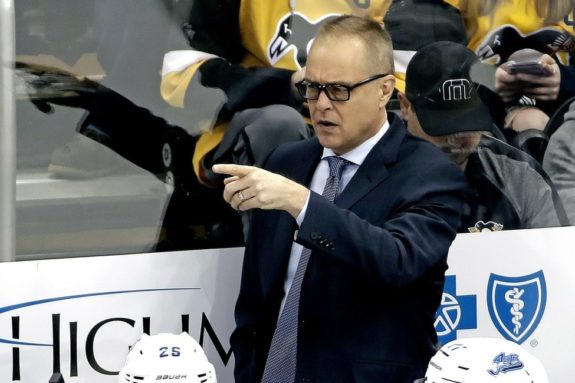
There are a couple of d-men in the stocks that are champing at the bit for more and could help correct the Jets defensive foibles if given an opportunity. That opportunity would only arise with an open space, however.
Poolman’s Ready for More
Tucker Poolman, the 25-year-old out of Iowa, is no raw rookie: he’s someone who could slide seamlessly into a right-side NHL assignment. He had an outstanding 2018-19 season with the Manitoba Moose, tallying 25 points, playing huge minutes in all situations, and making calm and correct reads nearly effortlessly. He was a major contributor to the Moose’s push from last in the entire AHL at Christmastime to within two pointsof a Calder Cup Playoff spot.
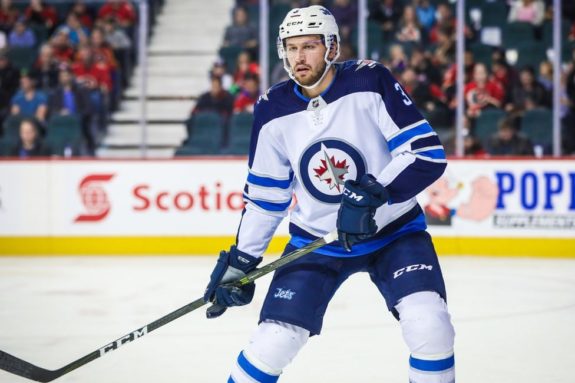
According to Moose head coach Pascal Vincent, Poolman played “like he was in the wrong league.” Unfortunately for Poolman, he was hampered by a concussion from late November through early January, and later, a lower body injury, ailments which limited him to 43 games.
If Poolman had been healthy all season, he likely would have seen some NHL action, specifically in early December when Dustin Byfuglien, Joe Morrow, and Dmitry Kulikov were all injured. Poolman was also passed over in mid-February in favour of Sami Niku after Morrow was injured in a fight. (Poolman later did get a call-up, but didn’t see any game action.)
Related: Jets Pick Niku Over Poolman…What a Bad Move
This writer didn’t agree with the move, as when Poolman was called upon to suit up for 24 Jets’ contests in 2017-18, he didn’t look out of place at all.
Niku Could Benefit, Too
Speaking of Niku, he’s another exciting prospect — a smooth skating, offensively dynamic blue-liner — who is on track to become an impactful, top-four defenseman. In 2017-18, the Finn tallied 54 points and was named the winner of the Eddie Shore Award for the AHL’s top defenseman in his AHL rookie campaign to remember.
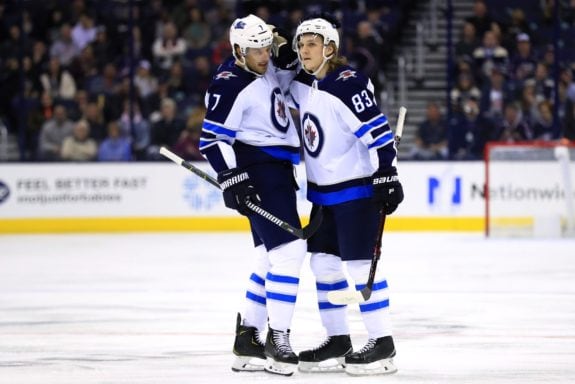
This season, Niku suited up for 30 NHL games. While the slick 22-year-old had some struggles in those games, and it was clear his skills (especially his strength) are not quite there yet, his play also exhibited signs of great promise at times.
The main problem is that Niku also spent a lot of time in the press box, playing in just 50 games between the NHL and the AHL compared to 77 the season before. He was a healthy scratch for the Jets’ final five regular season games and all six of their playoff contests.
The fact the Jets left Niku off the Moose playoff roster indicates they have no intention of ever sending him back to the farm and would rather let him learn at the NHL level. However, he’ll need to be given meaningful minutes — more than he got this season — if they expect him to blossom into a big-time player.
Unlike Trouba and Poolman, Niku is left-handed, but the right side is nonetheless familiar to him as he played on it often with the Moose.
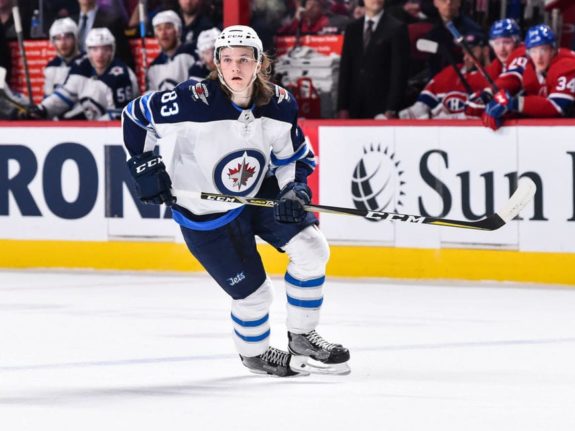
There’s also the possibility the Jets could snag a defensemen from whoever they trade Trouba to. Recently, The Hockey Writers’ own Jordan Deshane suggested the Sabres go after Trouba and send Rasmus Ristolainen to the Jets in return (though, in this writer’s opinion, the Sabres would have to throw in a number of sweeteners alongside the Finn to make that trade a reality.)
The Sooner, The Better
The Sabres are just one potential destination for Trouba (we’ll explore others in a future piece, because this one’s already getting on 3,000 words,) so it won’t be a matter of finding a suitor, just a matter of courting the one that gives the best value in return.
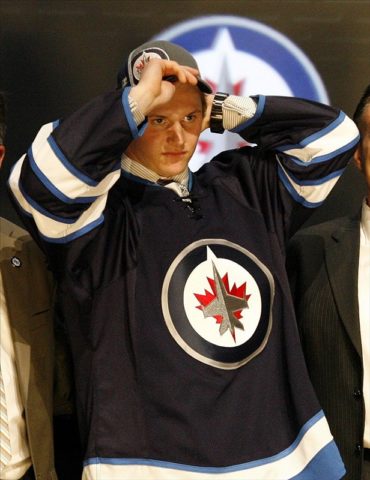
The quicker the Jets can deal Trouba, the better off they’ll be — it will give them more financial clarity when they enter negotiations with Patrik Laine and Kyle Connor — both of whom will command huge raises from their entry-level contracts— and allow them to more fully understand which UFAs and RFAs they can keep and which ones will have to go.
Trading him before the 2019 Draft on June 21-22 and getting a high-round pick or two would be ideal (remember, the Jets dealt away their first-rounder for the second straight season in order to snag Kevin Hayes from the New York Rangers at the Trade Deadline.)
There’s no doubt Trouba’s been a heady, steady contributor to the Jets since they chose him ninth overall in 2012, but the landscape of the franchise has dramatically changed since then. While their window for a Stanley Cup victory is still open, the road is going to be tougher, and even tougher yet if they choose to stick to the status quo that led to their first-round exit earlier this month.
Trading Trouba is the big move the Jets need to make. The reasons we explored above show there’s no doubt his time in Winnipeg has reached its best-before date, and shipping him out — whether that’s to acquire a new defenseman, fresh prospects, or simply to retain other pieces important to the Jets’ puzzle — is the right move.